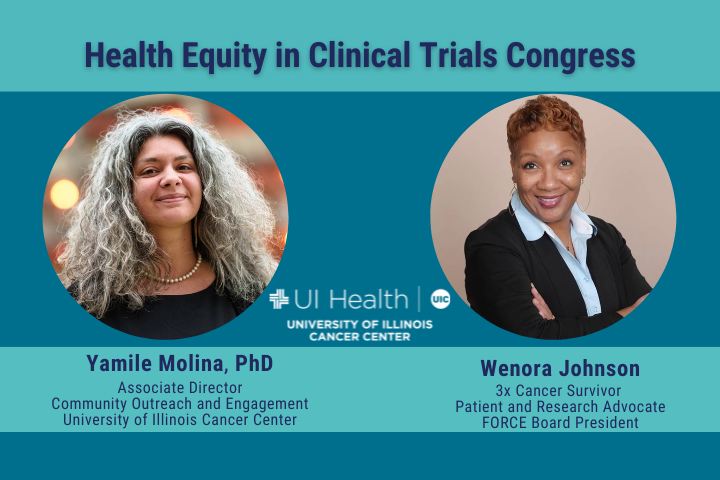
The University of Illinois Cancer Center participated in the second Health Equity in Clinical Trials Congress, a gathering focused on increasing diversity in clinical trials by bringing together pharmaceutical and biotech companies, clinical trial service providers, research and academic institutions, patient advocacy groups and regulatory agencies.
Cancer Center Associate Director for Community Outreach and Engagement Yamile Molina, PhD, served on the panel “Site Perspectives of Health Equity in Clinical Trial Developments.” Additionally, patient advocate and three-time cancer survivor Wenora Johnson, who was a featured speaker in April at the Cancer Center’s Dr. Gary Kruh Cancer Research Symposium and Student Poster competition, was on the panel “Patient Perspectives: Progressing Health Equity and Empowering Underserved Communities.”
The Cancer Center is a recognized thought leader for strategies to diversify clinical trials and create equitable cancer research so that discoveries to prevent, screen and treat cancer benefit all. At the Cancer Center, 79% of clinical trial participants are racial and ethnic minorities. Last year, the Cancer Center, under Molina’s leadership, hosted a series of panel discussions focused on structural solutions for diverse clinical trials, including a webinar that engaged leaders from National Cancer Institute (NCI)-designated cancer centers, the National Institutes of Health (NIH), pharmaceutical companies and cancer advocacy organizations.
Molina spoke during their panel about patient advocacy and site perspectives on inclusive clinical research. The Cancer Center is part of UI Health, which includes the Mile Square Health Center, a network of federally qualified health center (FQHC) locations. Molina is Associate Director for Community Engaged Research at Mile Square and Associate Professor in the Division of Community Health Sciences at the University of Illinois Chicago (UIC) School of Public Health.
During her panel, Johnson shared how her lived experience as a patient influenced her decision and participation in clinical trials, she provided recommendations on improving collaboration between patients and industry stakeholders and shared what trustworthiness means to patients. Johnson is also the Facing Our Risk of Cancer Empowered (FORCE) Board President. FORCE seeks to improve the lives of individuals facing heredity cancers by increasing awareness, access to care, better treatments and overall prevention.
The Health Equity in Clinical Trials Congress took place in Atlanta May 8-9.
